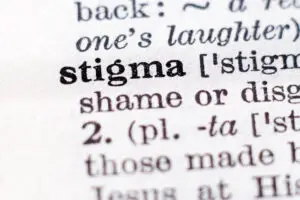
Living with Crohn’s disease, ulcerative colitis, or any form of inflammatory bowel disease
(IBD) is a daily challenge that often comes with a heavy burden of stigma. This stigma can
stem from a lack of understanding about the conditions themselves, leading to
misconceptions and judgments that can exacerbate the suffering of those affected. Adding a
complication like a fistula into the mix can intensify feelings of shame, isolation and
misunderstanding. In this blog post, we’ll explore the stigma surrounding IBD, the reality of
living with a fistula, and how we can foster understanding and compassion among friends
and family.
The Nature of the Stigma
1. Misunderstanding and Ignorance: Many people are unaware of what IBD is, often
mistaking it for a simple digestive issue. This lack of knowledge can lead to dismissive
attitudes and comments that minimize the real challenges faced by those with these
conditions.
2. Physical Appearance: IBD and its complications can cause visible symptoms that may
lead to judgment. When someone has a fistula, it may lead to discussions about hygiene or
personal care that feels invasive and hurtful.
3. Social Isolation: Fear of an unpredictable flare-up can lead individuals to withdraw
from social situations, perpetuating feelings of loneliness and exclusion.
4. Emotional Burden: The emotional toll of managing chronic illness can lead to feelings
of shame and guilt, particularly when loved ones don’t understand the complexity of the
experience.
Combating the Stigma
1. Education and Awareness: One of the most effective ways to combat stigma is
through education. Share accurate information about Crohn’s disease, ulcerative colitis, and
the challenges of living with a fistula. Consider providing resources such as pamphlets,
reputable websites, or even inviting loved ones to attend support groups or educational
seminars with you.
2. Open Conversations: Create a safe space for open dialogue about your experiences.
Use “I” statements to express how your condition affects your daily life, which can foster
empathy and understanding. For example, saying, “I feel really overwhelmed when I have to
manage my symptoms in public” can help others grasp the emotional weight you carry.
3. Normalize the Experience: Share stories that highlight both the struggles and the
victories of living with IBD. Normalize the conversation around bodily functions and
discomfort—this can help others understand that it’s okay to talk about these issues
without embarrassment.
4. Set Boundaries: It’s important to establish boundaries around what you’re
comfortable discussing. If certain topics make you uncomfortable, communicate this to your
loved ones. Encourage them to ask questions but also let them know when something feels
invasive.
5. Advocate for Yourself: Sometimes, people may not fully grasp your experience until
you advocate for your needs. Whether it’s asking for understanding during a flare-up or
discussing the realities of living with a fistula, being assertive can help create a more
supportive environment.
Talking to Friends and Family
1. Choose the Right Time: Find a calm moment to discuss your condition, ideally when
both you and your loved ones are relaxed and open to conversation.
2. Be Honest About Your Feelings: Share not just the physical symptoms but also the
emotional impact of living with IBD and a fistula. Explain how it affects your mood, social
life, and overall quality of life.
3. Invite Questions: Encourage your friends and family to ask questions. This can lead to
better understanding and dispel myths they may hold.
4. Use Analogies: Sometimes, comparing your experience to something more relatable
can help others understand. For instance, you might say that managing a flare-up can feel
like being on a roller coaster—there are ups and downs, and it’s hard to predict when the
next drop will happen.
5. Express Gratitude: When your loved ones show understanding or support,
acknowledge it. A little gratitude can go a long way in strengthening your relationship and
encouraging more open discussions in the future.
Conclusion
Combating stigma surrounding Crohn’s disease, ulcerative colitis, and fistulas requires
effort, understanding, and compassion from both those affected and their loved ones. By
educating ourselves, having open conversations, and fostering a culture of empathy, we can
create a supportive environment where everyone feels understood. Remember, your
experience matters, and sharing it can pave the way for greater awareness and acceptance.
Together, we can challenge the stigma and help others appreciate the strength it takes to
navigate life with IBD.

